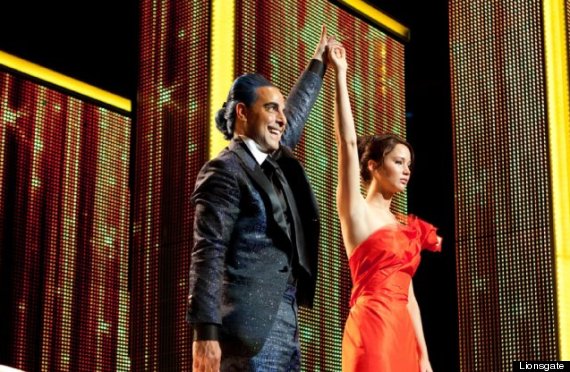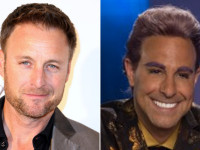
The protagonist of a televised competition series dissents against his authorities, threatening to break all of the rules. His rebellion enrages the show's big bad executives, who scheme to dispose of the contestant in an effort to quiet his supporters -- and save their livelihoods.
One question: Is this "The Bachelor" or "The Hunger Games" we're talking about?

It's not as far-fetched an analogy as one might think. In fact, throughout this season of "The Bachelor," similarities abound between the beloved ABC reality show and the blockbuster movie trilogy about a kind of reality show. What are "reapings" if not a form of casting call? The female contestants of "The Bachelor" make their entrances by shimmying out of limousines, sporting evening gowns and gags such as pregnant bellies and stethoscopes. In "The Hunger Games," tributes come in boy-girl pairs, and are introduced to the public through their heavily-styled getups ("girl on fire!") and deadly talent (archery). Both competitions feature contestants who are no more than show ponies, first admired for their beauty, then systematically destroyed.
Why? Because it makes for great entertainment. But also because the competitions provide hope. Just consider how President Snow, the villainous ruler of Panem, explains the need for a winner of the Hunger Games: "[Hope] is the only thing stronger than fear." And what could be more hopeful than love? ABC executives have peddled "The Bachelor" and its spin-off series, "The Bachelorette," for a whopping total of 27 seasons by promising such hope: of marriage, of true love, of more awkward televised wedding ceremonies. Their manipulative fantasy yields lucrative results, with 10.1 million viewers tuning in to this season's finale. It's a big business. Only now someone's come along to call bullshit on it all.
His name is Juan Pablo Galavis, of course, the 32-year-old former soccer player touted as the show's first "foreign" Bachelor. The Venezuelan star's previous anti-gay remarks and limited "ess okay" vocabulary had branded him all-around jerk well before Monday night's contentious final rose ceremony. He also neglected to propose to the "Bachelor" finalist, Nikki Ferrell, used as evidence of JP's insincerity about finding love, even though he was hardly the first contestant to do so. But it was his refusal to utter an I-love-you to Nikki that riled host Chris Harrison the most during the live "After the Final Rose" special. The resulting dialogue can only be described as a power struggle between Juan Pablo and the ever-intermeddling host:
[abbreviated] Harrison: How do you feel about this woman?
Harrison: How do you feel about this woman?
JP: I feel fantastic about this woman...
Harrison: How do you feel about her?
JP: Chris! I feel great! I'm very honest to her.
Harrison: So you love her?
JP: I'm not going to answer that question to you.
Harrison: What do you mean you don't say that?
JP: We're done with the show. We're so done.
Had Harrison donned gaudy eyeliner and blue hair, he could almost be mistaken for Caesar Flickerman, the love-happy master of ceremonies so excellently portrayed by Stanley Tucci in the "Hunger Games" films. In reality, Harrison is both host and executive producer of the show, which means he's also not above bullying tactics similar to those of Panem's evil President Snow. What Juan Pablo delivered wasn't the season finale Harrison wanted or the "big surprise" ABC execs had been promised. Just as Katniss Everdeen threatened the Capitol, Juan Pablo disrespected the administration by calling out the hypocrisy of the show's entire premise: that falling in love in seven weeks is preposterous. JP's resistance to profess love for Nikki was a crack in the entire "Bachelor" institution: even the Bachelor himself was refusing to play the game laid out for him.

Juan Pablo wasn't the only one to buck tradition in this version of "The Bachelor Games." Contestants Sharleen Joynt and Andi Dorfman walked away from the show before formal elimination, citing their inability to see a future with Juan Pablo as the reason for their departure. "I knew he wasn't the one for me ultimately … we just didn't get each other completely," Joynt admitted during the "Women Tell All" special. Their rejection of the game is akin to tributes in "The Hunger Games" who refuse to fight. Juan Pablo finds his Peeta instead in Nikki, a child nurse whose loyalty to Juan Pablo far exceeds her loyalty to the show. They win; "The Bachelor" loses.
On the opposite end of the battle, Season 17's Sean Lowe could be seen as a career tribute, in both build and belief. A Stepford Bachelor if there ever was one, he appears to have been perfectly bred for the role. Lowe, who is now married to "The Bachelor" contestant Catherine Giudici, showed just how seriously he takes "The Bachelor" business when he slammed JP on Twitter: "You owe it to the fans and network to open up. That's the job."
Considering that Suzanne Collins, the author of "The Hunger Games" books, modeled her dystopian future after one that mimicked the gladiatorial games of the past and our reality show-crazed culture of the present, it's unsurprising there should exist so many parallels. But in a classic case of life imitating art imitating life, "The Bachelor" closed the circle with Monday night's finale by producing its own uprising.
ABC executives have been trying to convince us for years that their show is a legitimate platform for finding true love -- despite the fact that only five couples (not including JP and Nikki) in "Bachelor" history remain together. But their world isn't real life. By subverting the system, Juan Pablo Galavis is the hero reality TV has been dreading.
Follow Youyoung Lee on Twitter: @youyoung_lee.
